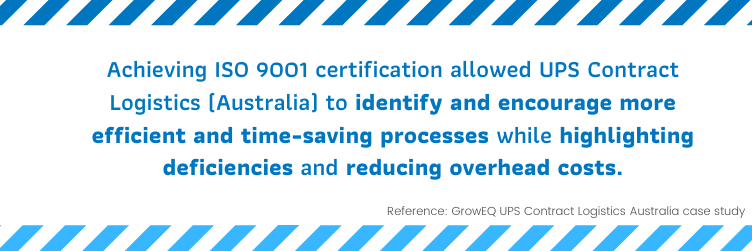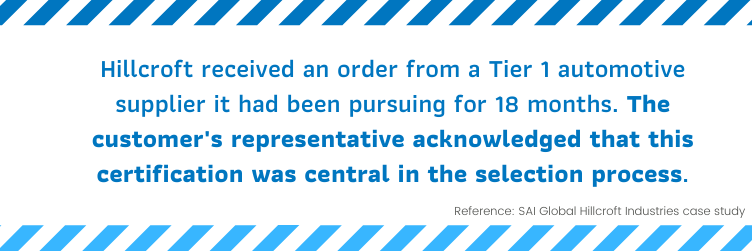ISO 9001:2015 is defined as the international standard that specifies requirements for a quality management system (QMS). The aim of the standard is not about establishing a concrete set of procedures that are complicated but to provide a workable management system that is suitable for your organisation. ISO 9001 is suitable for small and large organisations and applies to almost every industry. In fact, the recently revised ISO 9001:2015 was improved to make it more accessible to various types of enterprises.
While it is not a legal requirement to become certified for ISO 9001, it can definitely help towards achieving business objectives and improving the quality and service you provide for your customers. There is a higher demand for tender contracts now requiring companies to be certified or show evidence that they are transitioning to certification. In addition to this requirement, there are notable benefits from an internal and external perspective that should make you consider becoming ISO 9001 certified.
Here are our 5 main benefits of ISO 9001 that can set up your business for success:
- Increase in efficiency, productivity and profit
- Overcome management challenges
- Improved customer perception
- Higher customer satisfaction levels
- Improved communications, morale and job satisfaction
Increase in efficiency, productivity and profit
The structure of ISO 9001 is split into ten sections, with the last seven focusing on developing the Quality Management system. These seven sections are Context of the Organisation, Leadership, Planning, Support, Operation, Performance Evaluation and Improvement. Each of these sections is established on a Plan-Do- Check- Act (PDCA) cycle, allowing important processes to be reviewed and continually improved depending on their effectiveness. As a result, actively seeking continual improvement allows compliant businesses to stay ahead of their competition and can boost large increases in efficiency, productivity and ultimately profitability.

Overcome management challenges
Typically for smaller businesses and organisations, managers are dealing with multiple aspects of the business such as finance, marketing and HR. With managers more focused on the day-to-day activities of the business it can be difficult to strategise and develop a long-term plan. By undertaking certification for ISO 9001, it can help managers review their processes and take a birds-eye view of understanding where they can improve and delegate certain processes so they can focus more on strategic activities of the business.
Improved customer perception
Having certification in ISO 9001 can be a prerequisite for some customers when they are considering suppliers as it allows them to feel confident in your ability to provide the goods or services that they require. As ISO 9001 is an accreditation that is recognised worldwide, international customers or potential partners can immediately have an initial sense of assurance that you deliver exceptional quality. Some governments and public bodies may only contract suppliers that are ISO 9001 certified, and without certification, you may not even be considered. A Dun and Bradstreet report found that 85% of the registered firms reported external benefits which included higher perceived quality, greater customer demand and a 30% reduction in customer claims.

Higher customer satisfaction levels
Becoming a customer-focused company is at the forefront of the ISO 9001 QMS certification. By identifying and meeting customer requirements and needs, your business can be in the best position to improve repeat customer purchases, provide a more targeted service and efficient delivery times. A study on the impact of ISO 9001 found that the certification has a positive effect on consumer satisfaction measured by (consumer complaints, frequent buying, positive buying trends, quality perceived by consumers and quality provided by companies).

Improved communications, morale and job satisfaction
With continual improvement at the forefront of ISO 9001, creating a positive culture internally is the first step in ticking off those business objectives and creating a competitive advantage in your marketplace. A sound QMS can provide an abundance of benefits for your employees as everyone has involvement in seeking improvements, not just the quality managers.
A QMS reduces the inefficiencies within your processes and provides more clarity to your employees, this, in turn, helps staff have a sense of ownership in their day-to-day role. As processes are more clear and easily understood, it reduces time wasted from asking questions and avoids the need to micro-manage every process.
Becoming ISO 9001 certified can help in improving customer perception and may be a deciding factor when clients select a company to work with. Having clearly defined roles and responsibilities will allow your staff to understand their part in the quality and success of the goods or services you provide. They will be aware of the fact that the growth of the company may result in personal incentives for them such as a promotion or additional perks.
The absence of a QMS can lead to miscommunication resulting in errors and poor team morale. On the other hand, the accountability given to your staff from implementing a QMS can lead to improved job satisfaction and therefore retention rates, which could be the difference in retaining high-quality staff.







